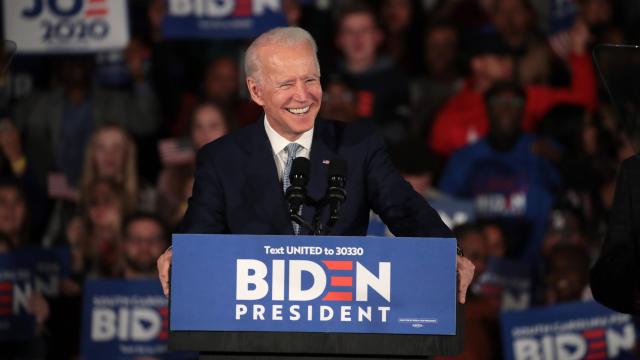Democratic Party officials put together a draft of the 2020 platform which includes several pages on the climate crisis, but contains barely any mention of the biggest cause of that crisis: burning fossil fuels.
The 80-page draft, which was produced by 15 party leaders, was sent to nearly 200 party delegates on Tuesday. Those party members now have the opportunity to amend the draft before it is ratified at the Democratic Party Convention in August. Earther obtained a copy of the document on Wednesday.
Like Joe Biden’s updated climate plan and the Biden-Sanders task force climate recommendations to the DNC, the draft shows how far climate advocates have pushed the party in just four years in terms of scope and ambition. Whereas DNC’s 2012 platform included just a half a page on climate policy and the 2016 platform grew a bit to three pages, the 2020 draft devotes four pages to climate policy proposals, including some notable bright spots.
And yet, the document still falls far short of the recommendations of leading climate scientists because it doesn’t have a plan to phase out U.S. fossil fuel production or use. Unlike the 2016 platform, the new draft is silent on phasing out extraction of fossil fuels from on public lands and doesn’t include language to halt fracking in localities that oppose it. That represents a step backward for the climate, though perhaps this is an attempt to appeal to moderates and win voters fracking states like Pennsylvania, but polling shows most Democrats favour a fracking ban.
The document’s four pages on climate draw heavily from the recommendations of the Biden-Sanders task force. But there’s far less visible influence from the recommendations put forth by the DNC’s Council on the Environment and the Climate Crisis last month, which included plans to move the country’s electricity, transportation, and building sectors to 100% renewable energy by 2030 and to ban fracking and crude oil exports — policies which are in line with the scope of the crisis at hand.
[referenced url=”https://gizmodo.com.au/2020/06/this-is-democrats-make-or-break-climate-moment/” thumb=”https://gizmodo.com.au/wp-content/uploads/2020/06/18/ugntj53c1sss7f5ubk86-300×169.jpg” title=”This Is The U.S. Democrats’ Make-or-Break Climate Moment” excerpt=”The world is facing a make-or-break moment for climate policy. Without unprecedented action, we’re all but guaranteed to see catastrophic climate breakdown by the end of the decade.”]
To be clear, there are some good ideas. There’s a plan to transition all 500,000 of the nation’s school buses to zero emissions alternatives within five years, and to weatherize and upgrade energy systems in hospitals, schools, public housing, and municipal buildings. There is a commitment to “make the U.S. agriculture sector the first in the world to achieve net-zero emissions,” which is a far more specific goal for agriculture than any of those set in previous platforms — though the draft doesn’t set a specific date to do so. And notably, there’s a goal of transitioning the nation’s power sector to 100% renewable energy by 2035 — five years sooner than the goalpost set in the recently released House Select Committee on the Climate Crisis plan.
“This is one of the climate movement’s biggest wins,” Daniel Aldana Cohen, a sociologist at the University of Pennsylvania who served on the advisory panel to the DNC Council on the Environment and the Climate Crisis’ platform committee, told Earther.
If adopted, the document would also expand conservation laws to cover 30% of U.S. land and waters. But the draft document shines more light on environmental justice than previous platforms, including a promise to direct a “significant portion of clean energy and sustainable infrastructure investments to historically marginalised communities,” supporting job creation, clean energy installation, and disaster preparedness.
“It is good to see commitments from the DNC platform to unionized jobs, investment in public and affordable housing, and commitments to renewable energy,” Johanna Bozuwa, co-manager of the climate and energy program at the Democracy Collaborative, told Earther in an email.
The draft also promises to foster energy justice in low-income communities by weatherizing and retrofitting buildings, investing in energy-efficient public housing, and improving energy access. Aldana Cohen, however, said he would have liked to see more specifics, and more harnessing of the power of the public sector, in these proposals.
“The platform should be more clear and accountable — specifying precisely how much public housing will be retrofitted,” he said. “And it needs to be more ambitious on grant programs to retrofit low-income tenants’ homes, because no market incentive program will ever reach those units, and low-income people and people of colour pay the most disproportionately high energy bills of anyone in the U.S.”
In addition, without a commitment to ending the oil and gas industry, many frontline communities will continue to suffer. Polluting fossil fuel infrastructure including either.
“This proposal fails to dismantle the political and economic powers in place that allow the current extractive system to perpetuate, meaning it will not go nearly far enough to secure a just and equitable transition,” said Bozuwa.
The DNC draft sets a goal of making the U.S. economy carbon-neutral by 2050, which many climate scientists say is too late given that the country is the biggest historical climate polluter. And though it includes many sector-specific goals, it doesn’t set intermittent goals for total decarbonization before then, which could make it difficult to hold a Biden administration and Democrat-controlled Senate accountable if he wins November’s presidential election and Democrats take back the Senate.
The platform will to be finalised ahead of Democrats’ convention next month. Party officials could still strengthen it by listening to scientists and the climate movement that consistently advocated for not just more renewable energy, but also fossil fuel phaseout. Polls show doing so could win over voters, who support strong climate policy. And more importantly, it would ensure we all have a future on Earth.
